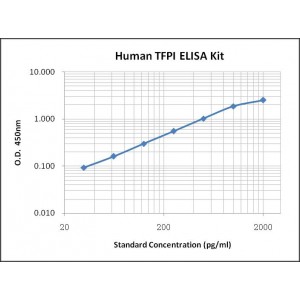More info
Assay Range | 31.2-2,000 pg/mL |
Sensitivity | 10.0 pg/mL |
Specificity | No cross-reaction with other related substances detected |
Size | 96T |
Storage | Store at 2 - 8ºC. Keep reconstituted standard and detection Ab at -20 ºC |
Assay Principle | Sandwich ELISA |
Sample Volume | 100 µL final volume, dilution factor varies on samples |
Sample Type | serum, plasma or cell culture supernatant |
Detection Method | Chromogenic |
Kit Components
1. Recombinant Human TFPI standard: 2 vials
2. One 96-well plate coated with Human TFPI Ab
3. Sample diluent buffer: 12 mL - 1
4. Detection antibody: 130 µL, dilution 1:100
5. Streptavidin-HRP: 130 µL, dilution 1:100
6. Antibody diluent buffer: 12 mL x1
7. Streptavidin-HRP diluent buffer: 12 mL x1
8. TMB developing agent: 10 mL x1
9. Stop solution: 10 mL x1
10. Washing solution (20x): 25 mL x1
Background
Tissue Factor Pathway Inhibitor (TFPI or TFPI-1), also known as Extrinsic Pathway Inhibitor (EPI) or Lipoprotein-associated Coagulation Inhibitor (LACI), is a key regulator involved in blood coagulation which is mediated by a series of coagulation factors and their regulators. In response to blood vessel injury, tissue factor is released from endothelial cells and then complexes with factor VII and proteolytically activates factor X and factor IX, ultimately leading to the conversion of prothrombin to thrombin and fibrin clot formation. TFPI inhibits coagulation through the formation of a quaternary complex with factor X, tissue factor, and factor VII, preventing factor X from activation. Full-length TFPI is a 304 amino acid (aa) glycoprotein containing an N-terminal acidic region, three Kunitz domains, and a C-terminal basic domain. The first Kunitz domain interacts with tissue factor/factor VII complex, while the second one interacts with factor X. TFPI is produced by endothelial cells and released by heparin stimulation. Abnormal TFPI concentrations in the circulation have been associated with various pathological conditions characterized by hemostatic disturbance, such as thrombosis, disseminated intravascular coagulation, and sepsis. TFPI has also been demonstrated to be beneficial when used as an anti-thrombotic remedy to treat sepsis, inflammatory diseases, and cardiovascular diseases.


